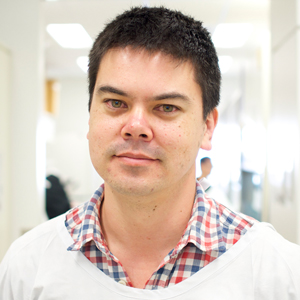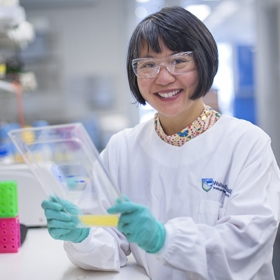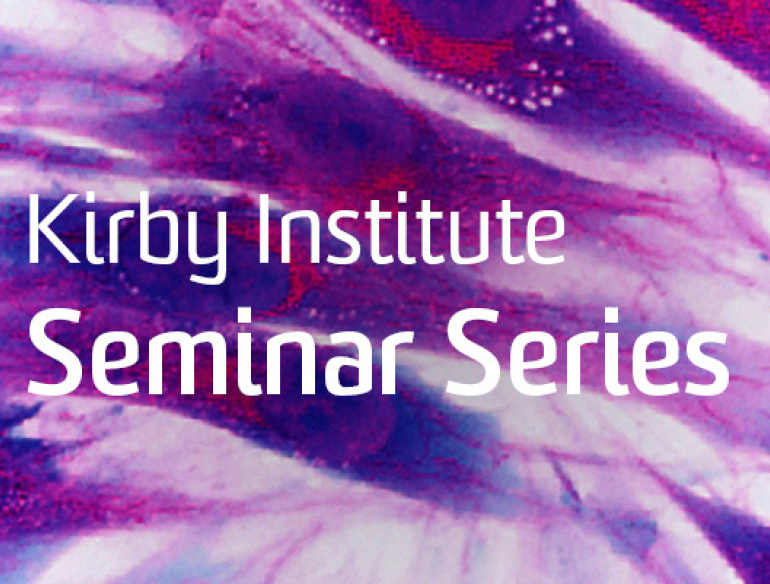Location:
Webinar via Microsoft Teams
Contact for enquiries
Rata Joseph, +61 (2) 9385 0900 or recpt@kirby.unsw.edu.au
Webinar link: https://bit.ly/COVID19Melb
Kirby Institute Seminar Series presents
 |
Professor Katherine Kedzierska Professor Katherine Kedzierska is Laboratory Head in Department of Microbiology and Immunology, University of Melbourne, at the Peter Doherty Institute for Infection and Immunity. Katherine received her PhD from Monash University in 2002 for her studies on the mechanisms underlying defective immune functions after HIV infection. Her PhD work was recognised by the 2001 Premier’s Commendation for Medical Research, 2002 Monash University Mollie Holman Doctoral Medal and an NHMRC Peter Doherty Postdoctoral Fellowship to pursue her postdoctoral research with Laureate Professor Peter Doherty at University of Melbourne. Her postdoctoral work was focused on the early establishment of influenza-specific CD8+ T cell memory, TCR repertoire diversity and viral escape in a mouse model of influenza virus infection. In 2007, she got awarded an NHMRC RD Wright Fellowship and grant funding to establish her own research team. She is currently an NHMRC Leadership Fellow and a group leader of ‘Human T cell Laboratory’ in Department of Microbiology and Immunology at University of Melbourne. Her research interests include human T cell immunity to pandemic, seasonal and newly emerged influenza viruses, anti-viral immunity in the young, the elderly and Indigenous Australians, viral escape and generation of immunological memory in human influenza infection. She also studies human immunity to SARS-CoV2 in COVID patients. Katherine is a recipient of a number of prestigious awards, including 2016 Australian Academy of Science Jacque Miller Medal, 2011 NHMRC Excellence Award and 2011 Scopus Young Researcher of the Year Award. She is an Adjunct Professor at Fudan University, Shanghai, China and a Co-Director of the Sino-Australia Joint Research Laboratory for the Emerging and Re-emerging Infectious Disease Research, Fudan-Melbourne University, located at the Shanghai Public Health Clinical Centre. Katherine is a Co-Head of Indigenous Health at the Doherty Institute. In 2019, she was elected as a Fellow of the Australian Academy of Health and Medical Science (AAHMS). |
|
 |
||
 |
Dr Adam Wheatley Dr Adam Wheatley leads a research team aiming to better understand the development and regulation of humoral immune responses to important viral diseases such as influenza and SARS-CoV-2. After a PhD at the University of Melbourne, he undertook post-doctoral training at the Vaccine Research Center, National Institutes of Health, USA. Since returning to the Doherty Institute in 2015, he and his team are actively researching human B cell immunology and anti-viral immunity, in particular mechanisms to generate broad and lasting antibody-based protection from infectious viral diseases. |
|
 |
||
 |
Associate Professor Wai-Hong Tham Associate Professor Wai-Hong Tham received her PhD from Princeton University. She is currently a Howard Hughes-Wellcome Trust International Research Scholar and Joint Division Head of Infection and Immunity at the Walter and Eliza Hall Institute. The Tham laboratory is focused on deciphering new host-pathogen interactions that govern successful malaria infection. The overarching aim is to rationally design and generate new inhibitors or antibodies that block these interactions and hence, malaria infection in humans. For her contribution to understanding malaria parasite invasion, she has received the 2020 International Award Biochemistry Society, 2019 and 2011 Eureka Prize for Infectious Diseases Research (team prize), the 2017 David Syme Research Prize and the 2018 Burnet Prize. Twitter: @tham_lab @WEHI_Research |
Abstract
It is with great pleasure that the Kirby Institue will be welcoming three forerunners in COVID-19 research from the Peter Doherty Institute, University of Melbourne, and The Walter and Eliza Hall Institute. Professor Katherine Kedzierska, Dr Adam Wheatley, and Associate Professor Wai-Hong Tham, have been prolific in publishing papers and commentary this year on the topic of COVID-19 immunity, including multiple Nature Medicine papers. Professor Kedzierska and Dr Wheatley will present analysis on the development of SARS-CoV-2 immunity in COVID-19 infected individuals. Specifically, Professor Kedzierska will be presenting her work looking at the correlation between a stronger, multi-faceted immune response and clinical outcomes, and Dr. Wheatley will focus on antibodies, B cells, and T follicular helper cells specific to the SARS-CoV-2 spike protein, which is the target of multiple candidate vaccines. Associate Professor Tham will then discuss the potential use of nanobodies to prevent SARS-CoV-2 infection via blocking virus entry into cells.
Understanding immunity to SARS-CoV2 in patients hospitalised with COVID-19
Professor Katherine Kedzierska
Our work on immunity to SARS-CoV2 has demonstrated the breadth of concomitant immune responses associated with recovery in patients with mild to moderate COVID-19 requiring hospitalisation. Our study showed increased antibody-secreting cells, follicular T-helper cells, activated CD4+ and CD8+ T-cells and IgM/IgG SARS-CoV-2-binding antibodies detected in blood, prior to resolution of clinical symptoms. These immunological changes persisted for at least 7 days following full resolution of symptoms, indicating substantial anti-viral immunity in non-severe COVID-19. Overall, our work indicates that robust multi-factorial immune responses can be elicited towards the newly-emerged SARS-CoV-2 and early adaptive immune responses might correlate with better clinical outcomes.
Immunogenic profile of SARS-CoV-2 spike following infection and immunisation
Dr Adam Wheatley
Multiple candidate vaccines designed to elicit protective neutralising antibodies targeting the viral spike glycoprotein are rapidly advancing through clinical trial. We undertook an in-depth characterisation of humoral and cellular immunity against SARS-CoV-2 spike in humans following mild to moderate SARS-CoV-2 infection to better understand the immunogenic properties of the spike in human populations. We find anti-spike antibody s routinely elicited by infection and correlated with plasma neutralising activity. Further spike-specific memory B cells and circulating T follicular helper cells (cTFH) were readily detected and phenotypically characterised within convalescent donors. Using regression analysis, we find high serum neutralisation activity was associated with increased spike-specific antibody, but notably also with the relative distribution of spike-specific cTFH subsets. Finally, we examined the immunogenicity of spike-based immunogens in mouse and non-human primate immunisation models.
Nanobodies against COVID-19
Associate Professor Wai-Hong Tham
The coronavirus spike protein plays a crucial role in viral attachment, fusion and entry. Coronavirus spike proteins attach to different human receptors and undergo proteolytic cleavage which provides a subsequent trigger for membrane fusion. Anti-viral therapies such as nanobodies that block attachment and the ability to undergo membrane fusion may effectively inhibit the process of viral entry and stop the infection.
